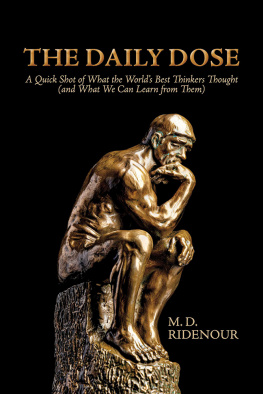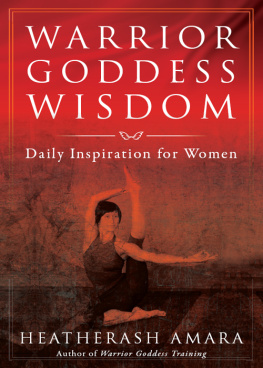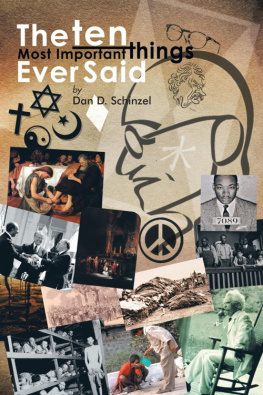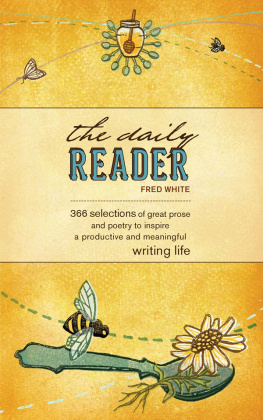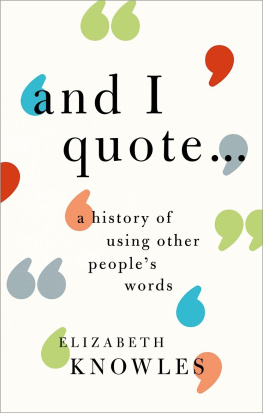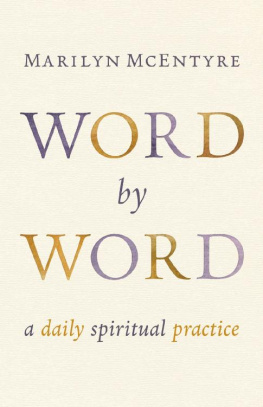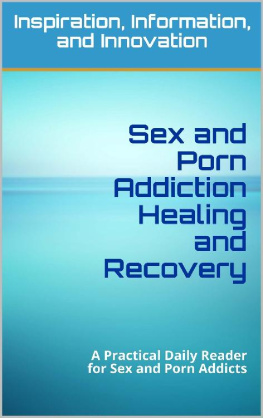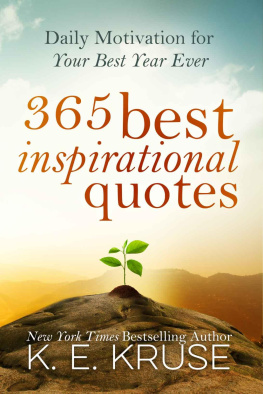
Copyright 2020 M. D. Ridenour
Print ISBN: 978-1-09833-221-1
eBook ISBN: 978-1-0983-322-28
All rights reserved. No part of this publication may be reproduced, distributed, or
transmitted in any form or by any means, including photocopying, recording, or other electronic or mechanical methods, without the prior written permission of the publisher, except in the case of brief quotations embodied in critical reviews and certain other noncommercial uses permitted by copyright law.
First Edition
Printed in the United States of America
To my family, who taught me the meaning of unconditional love;
and to my friends, who taught me how to laugh at myself.
Table of Contents
Introduction
Like many of you, I like to read, and I do manage to read quite a bit: In addition to various newsletters and research reports, I subscribe to three magazines, take two daily newspapers, and usually have two books going at once. And, of course, there is a seemingly endless stream of internet articles that grab my attention. But what I really like are daily readers, like this one. I like little snippets of trivia; I like gleaning insights from history; I like the simple food-for-thought aspect of philosophical inquiry. Learning something new every day is important to me, but the truth is I especially like daily readers because they encourage me to set aside some quiet time each and every day: to relax, to think, to contemplate. In a way, its like having a standing appointment with an old friend. In my case, that appointment is for morning coffee, and I never miss it.
The idea for putting together my own daily reader came about a few years ago, when I began to study philosophy, in general, and Stoicism in particular. I found myself enthralled by Senecas Moral Letters to Lucilius . Ive also read Marcus Aurelius, and some Epictetus, but for me, reading Senecas Letters was like sitting at my grandfathers knee, listening to him talk and picking up the bits of wisdom that he would weave into his stories. I found it very comforting. I also found myself wondering:
What is the point of accumulating knowledge, experience, and wisdom if you dont share it or pass it on?
This is the question that prompted me to begin this journey. Im a parent, and although my kids are grown, I still feel the need to impart what little I know, in the hope that it might be useful to them at some point in their lives. It simply cannot be helped, but I also wanted to do something that might help them to know me, not just as their father, but as a person. I did not want them to ever have to wonder what I thought or felt about the various things that we all think about but dont necessarily talk about all that much. I wanted them to know not only what I have found to be true, but what people much smarter and wiser than I have shared with the world.
And so I enlisted a little help which is how we ended up with The Daily Dose , a daily reader that sneaks a peek at What the Worlds Best Thinkers Thought (and What We Can Learn from Them).
The expert thinkers Ive assembled here have plenty to say, usually about things they know very well and often about the things they know best. That being said, I wasnt particularly interested in yet another book full of famous people and their most familiar quotes. This isnt Bartletts. No, I wanted to go just a little bit off the beaten path. The same goes for the mini-biographies: what interested me was sharing some of the lesser-known details about the lives of these remarkable people, not rehashing the same old stories that everyone already knows by heart. In other words, I wanted to make sure that we could all learn something new, or ponder something new, each and every day. That was my goal, and I can tell you that it made for a very interesting intellectual pursuit. Hopefully, you will find reading it equally enjoyable.
A few words on the way things are organized...
Each day begins with a word that is related to the human condition. It might be Compassion, or Adversity; Denial, or Forgiveness; Love, Purpose, or Consequences. Each of these words is a building block: an emotional or intellectual starting point that is then reflected in or connected to a quote from one of historys greatest thinkers. The quotes are in turn followed by a paragraph or two that expounds on a general thought or idea that is inherent to the word and the quote. These blurbs are generally observational in nature, and it is my hope that they prompt the reader to think, and encourages him or her to do . Each day then ends with a mini-biography of the Thinker and if you are paying attention, you may notice that a subtle thread often runs through each of the days components, from the word to the quote to the blurb to the mini-biography. Or does it?
Happy hunting, and thank you for reading The Daily Dose.
January 1st
Admiration
I cannot help thinking that there is something to admire in everyone,
even if you do not approve of them.
E. M. Forster
English Novelist, Essayist
1/1/1879 6/7/1970
There is always some measure of humanity, no matter how small, no matter how well-hidden, in each and every one of us. And within that humanity, we can be certain that there is something an unflappability, a sense of humor, a love of animals, some kind of animating principle that is worthy of our appreciation. Its there; weve simply got to find it.

E. M. Forster was a novelist, short story writer, librettist, essayist, and literary critic. He was nominated for the Nobel Prize in Literature in sixteen different years.
Forster is best known for a trio of novels: A Room with a View , Howards End , and A Passage to India . He typically wrote about the hypocrisy inherent in British society, and the attendant snobbery and condescension therein.
A pacifist, Forster managed to avoid conscription into the British Army during World War I by signing on as Chief Searcher with the Red Cross. In this role, he spent three years in Alexandria, Egypt, interviewing wounded soldiers in order to get information about their fellow soldiers who had gone missing in action.
After the war, Forster spent time working as a private secretary to a Maharajah in India. His experiences there would lead to A Passage to India , which explores the complexities of cross-cultural friendships amid the backdrop of the growing movement for Indian independence from British rule. It was the last of Forsters novels to be published while he was still alive.
January 2nd
Reverence
All people have a natural desire to be needed, to have
their importance to others tangibly confirmed.
Daisaku Ikeda
Japanese Buddhist Philosopher, Author
Born 1/2/1928
Where there is kindness, there is deference a certain devotion to the idea that all lives are worthy of respect, and even reverence. Sometimes, it is as simple as saying thank you: a small token of gratitude that is both an acknowledgment of a kindness freely given and an appreciation of anothers contribution to our happiness. There are many little kindnesses that often go unnoticed, or unappreciated, which is a shame, because that moment of acknowledgment is itself a gift shared by both the giver and the receiver.


